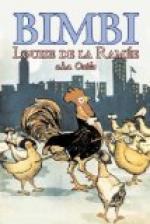Findelkind slowly and feebly rose, and sat up on the pavement, and looked up, not at his father, but at the knight Theodoric.
“I thought they would help me to keep the poor,” he muttered feebly, as he glanced at his own wallet.” And it is empty— empty.”
“Are we not poor enough?” cried his father, with natural impatience, ready to tear his hair with vexation at having such a little idiot for a son. “Must you rove afield to find poverty to help, when it sits cold enough, the Lord knows, at our own hearth? Oh, little ass, little dolt, little maniac, fit only for a madhouse, talking to iron figures and taking them for real men! What have I done, O heaven, that I should be afflicted thus?”
And the poor man wept, being a good affectionate soul, but not very wise, and believing that his boy was mad. Then, seized with sudden rage once more, at thought of his day all wasted, and its hours harassed and miserable through searching for the lost child, he plucked up the light, slight figure of Findelkind in his own arms, and, with muttered thanks and excuses to the sacristan of the church, bore the boy out with him into the evening air, and lifted him into a cart which stood there with a horse harnessed to one side of the pole, as the country people love to do, to the risk of their own lives and their neighbors’. Findelkind said never a word; he was as dumb as Theodoric had been to him; he felt stupid, heavy, half blind; his father pushed him some bread, and he ate it by sheer instinct, as a lost animal will do; the cart jogged on, the stars shone, the great church vanished in the gloom of night.
As they went through the city towards the riverside along the homeward way, never a word did his father, who was a silent man at all times, address to him. Only once, as they jogged over the bridge, he spoke.
“Son,” he asked, “did you run away truly thinking to please God and help the poor?”
“Truly I did!” answered Findelkind, with a sob in his throat.
“Then thou wert an ass!” said his father. “Didst never think of thy mother’s love and of my toil? Look at home.”
Findelkind was mute. The drive was very long, backward by the same way, with the river shining in the moonlight and the mountains half covered with the clouds. It was ten by the bells of Zirl when they came once more under the solemn shadow of grave Martinswand. There were lights moving about his house, his brothers and sisters were still up; his mother ran out into the road, weeping and laughing with fear and joy.
Findelkind himself said nothing.
He hung his head.
They were too fond of him to scold him or to jeer at him; they made him go quickly to his bed, and his mother made him a warm milk posset and kissed him.
“We will punish thee to-morrow, naughty and cruel one,” said his parent. “But thou art punished enough already, for in thy place little Stefan had the sheep, and he has lost Katte’s lambs—the beautiful twin lambs! I dare not tell thy father to-night. Dost hear the poor thing mourn? Do not go afield for thy duty again.”




